Abortion in the Bible and Church History
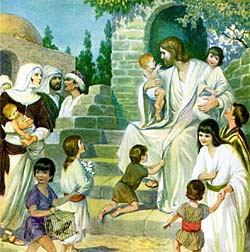
There is a small but influential circle of prochoice advocates who claim to base their beliefs on the Bible. They maintain that “nowhere does the Bible prohibit abortion.” [1] Yet the Bible clearly prohibits the killing of innocent people (Exodus 20:13). All that is necessary to prove a biblical prohibition of abortion is to demonstrate that the Bible considers the unborn to be human beings.
Personhood in the Bible
A number of ancient societies opposed abortion, [2] but the ancient Hebrew society had the clearest reasons for doing so because of its foundations in the scriptures. The Bible teaches that men and women are made in the image of God (Genesis 1:27). As the climax of God's creation mankind has an intrinsic worth far greater than that of the animal kingdom placed under His care. Throughout the Scriptures, personhood is never measured by age, stage of development, or mental, physical, or social skills. Personhood is endowed by God at the moment of creation - before which there was not a human being and after which there is. That moment of creation can be nothing other than the moment of conception.
The Hebrew word used in the Old Testament to refer to the unborn (Exodus 21:22-25) is yeled, a word that “generally indicates young children, but may refer to teens or even young adults.” [3] The Hebrews did not have or need a separate word for unborn children. They were just like any other children, only younger. In the Bible there are references to born children and unborn children, but there is no such thing as a potential, incipient, or “almost” child.
Job graphically described the way God created him before he was born (Job 10:8-12). The person in the womb was not something that might become Job, but someone who was Job, just a younger version of the same man. To Isaiah, God says, “This is what the Lord says - he who made you, who formed you in the womb” (Isaiah 44:2). What each person is, not merely what he might become, was present in his mother's womb.
Psalm 139:13-16 paints a graphic picture of the intimate involvement of God with a preborn person. God created David's “inmost being,” not at birth, but before birth. David says to his Creator, “You knit me together in my mother's womb.” Each person, regardless of his parentage of handicap, has not been manufactured on a cosmic assembly line, but has been personally knitted together by God in the womb. All the days of his life have been planned out by God before any have come to be (Psalm 139:16).
As a member of the human race that has rejected God, each person sinned “in Adam,” and is therefore a sinner from his very beginning (Romans 5:12-19). David says, “Surely I was sinful at birth.” Then he goes back even further, back before birth to the actual beginning of his life, saying he was “sinful from the time my mother conceived me” (Psalm 51:5). Each person has a sinful nature from the point of conception. Who but an actual person can have a sinful nature? Rocks and trees and animals and human organs do not have moral natures, good or bad. Morality can be ascribed only to a person. That there is a sin nature at the point of conception demonstrates that there is a person present who is capable of having such a nature.
Jacob was given prominence over his twin Esau “though not yet born” (Romans 9:11). When Rebekah was pregnant with Jacob and Esau, Scriptures says, "The babies jostled each other within her" (Genesis 25:22). The unborn are regarded as “babies” in the full sense of the term. God tells Jeremiah, "Before I formed you in the womb, I knew you" (Jeremiah 1:5). He could not know Jeremiah in his mother's womb unless Jeremiah, the person, was present in his mother's womb. The Creator is involved in an intimate knowing relationship not only with born people, but with unborn people.
In Luke 1:41,44 there are references to the unborn John the Baptist, who was at the end of his second trimester in the womb. The word, translated baby, in these verses is the Greek word brephos. It is the same word used for the already born baby Jesus (Luke 2:12, 16) and for the babies brought to Jesus to receive His blessing (Luke 18:15-17). It is also the same word used in Acts 7:19 for the newborn babies killed by Pharaoh. To the writers of the New Testament, like the Old, whether born or unborn, a baby is simply a baby. It appears that the preborn John the Baptist responded to the presence of the preborn Jesus in His mother Mary when Jesus was probably no more than ten days beyond His conception (Luke 1:41).
The angel Gabriel told Mary that she would be “with child and give birth to a son” (Luke 1:31). In the first century, and in every century, to be pregnant is to be with child, not with that which might become a child. The Scriptures teach the psychosomatic unity of the whole person, body, soul, and spirit (1 Thessalonians 5:23). Wherever there is a genetically distinct living human being, there is a living soul and spirit.
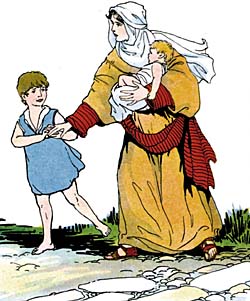
The Status of the Unborn
One scholar states: “Looking at Old Testament law from a proper cultural and historical context, it is evident that the life of the unborn is put on the same par as the person outside the womb.” [4]
When understood as a reference to miscarriage, Exodus 21:22-25 is sometimes used as evidence that the unborn is subhuman. But a proper understanding of the passage shows reference is not to a miscarriage, but to a premature birth, and that the “injury” referred to, which is to be compensated for like all other injuries, applies to the child as well as to his mother. This means that, “far from justifying permissive abortion, in fact grants the unborn child a status in the eyes of the law equal to the mother's.” [5]
Meredith Cline observes, "The most significant thing about abortion legislation in Biblical law is that there is none. It was so unthinkable that an Israelite woman should desire an abortion that there was no need to mention this offense in the criminal code." [6] All that was necessary to prohibit an abortion was the command, “You shall not murder” (Exodus 20:13). Every Israelite knew that the preborn child was indeed a child. Therefore, miscarriage was always viewed as the loss of a child and abortion as the killing of a child.
Numbers 5:11-31 is an unusual passage of Scripture used to make a central argument in A Prochoice Bible Study, published by Episcopalians for Religious Freedom. [7] They cite the New English Bible's peculiar translation, which makes it sound as if God brings a miscarriage on a woman if she is unfaithful to her husband. Other translations refer to a wasting of the thigh and swelling of her abdomen, but do not take it to mean pregnancy, which would presumably simply be called that directly if it were in mind.
The woman could have been pregnant by her husband, assuming they had been having sex, which Hebrews couples normally did. It appears that God was expected to do some kind of miracle related to the bitter water, creating a dramatic physical reaction if adultery had been committed. The text gives no indication of either pregnancy of abortion. Indeed, in the majority of cases of suspected adultery, there would be no pregnancy and therefore no child at risk.
The Prochoice Bible Study that cites the NEB's unique translation suggests if God indeed causes miscarriage, it would therefore be an endorsements of people causing abortions. This is a huge stretch, since neither the wife, husband, nor priest made the decision to induce an abortion, nor would they have the right to do so. The passage does not seem to refer to a miscarriage at all; but even if it did, there is a certainly nothing to suggest any endorsement of human beings initiating an abortion.
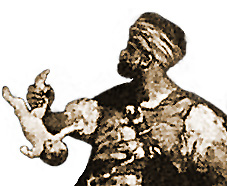
Child Sacrifice
Child sacrifice is condemned throughout Scripture. Only the most degraded societies tolerated such evil, and the worst of these defended and celebrated it as if it were a virtue. Ancient dumping grounds have been found filled with the bones of hundreds of dismembered infants. This is strikingly similar to discoveries of thousands of dead babies discarded by modern abortion clinics. One scholar of the ancient Near East refers to infant sacrifice as “the Canaanite counterpart to abortion.” [8] Unlike the pagan sacrifices, however, with abortion, child killing need no longer be postponed till birth.
Scripture condemns the shedding of innocent blood (Deuteronomy 19:10; Proverbs 6:17; Isaiah 1:15; Jeremiah 22:17). While the killing of all innocent human beings is detestable, the Bible regards the killing of children as particularly heinous (Leviticus 18:21; 20:1-5; Deuteronomy 12:31). The prophets of Israel were outraged at the sacrifice of children by some of the Jews. They warned that it would result in the devastating judgment of God on their society (Jeremiah 7:30-34; Ezekiel 16:20-21, 36-38; 20:31; compare 2 Kings 21:2-6 and Jeremiah 15:3-4).
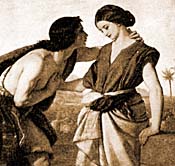
Abortion and Church History
Christians throughout church history have affirmed with a united voice the humanity of the preborn child. [9] The second-century Epistle of Barnabas speaks of “killers of the child, who abort the mold of God.” It treats the unborn child as any other human “neighbor” by saying, "You shall love your neighbor more than your own life. You shall not slay a child by abortion. You shall not kill that which has already been generated" (Epistle of Barnabas 19:5).
The Didache, a second-century catechism for young converts, states, "Do not murder a child by abortion or kill a newborn infant" (Didache 2.2). Clement of Alexandria maintained that "those who use abortifacient medicines to hide their fornication cause not only the outright murder of the fetus, but of the whole human race as well" (Paedogus 2:10.96.1).
Defending Christians before Marcus Aurelius in A.D. 177, Athenagoras argued, “What reason would we have to commit murder when we say that women who induce abortions are murderers, and will have to give account of it to God? …The fetus in the womb is a living being and therefore the object of God's care” (A Plea for the Christians, 35.6).
Tertullian said, "It does not matter whether you take away a life that is born, or destroy one that is coming to the birth. In both instances, destruction is murder" (Apology, 9.4). Basil the Great affirmed, "Those who give abortifacients for the destruction of a child conceived in the womb are murderers themselves, along with those receiving the poisons" (Canons, 188.2). Jerome called abortion “the murder of an unborn child” (Letter to Eustochium, 22.13). Augustine warned against the terrible crime of “the murder of an unborn child” (On Marriage, 1.17.15). Origen, Cyprian, and Chrysotom were among the many other prominent theologians and church leaders who condemned abortion as the killing of children. New Testament scholar Bruce Metzger comments, “It is really remarkable how uniform and how pronounced was the early Christian opposition to abortion.” [10]
Throughout the centuries, Roman Catholic leaders have consistently upheld the sanctity of human life. Likewise, Protestant reformer John Calvin followed both the Scriptures and the historical position of the church when he affirmed:
The fetus, though enclosed in the womb of its mother, is already a human being, and it is a most monstrous crime to rob it of the life, which it has not yet begun to enjoy. If it seems more horrible to kill a man in his own house than in a field, because a man's house is his place of most secure refuge, it ought surely to be deemed more atrocious to destroy a fetus in the womb before it has come to light. [11]
Modern theologians with a strong biblical orientation agree that abortion is the killing of a child. Dietrich Bonhoeffer, who lost his life standing up against the murder of the innocent in Germany, argued that abortion is “nothing but murder.” [12] Karl Barth stated,
“The unborn child is from the very first a child… it is a man and not a thing, not a mere part of the mother's body… Those who live by mercy will always be disposed to practice mercy, especially to a human being which is so dependent on the mercy of others as the unborn child.” [13]
In the last few decades it has become popular for certain theologians and ministers to be proabortion. The Religious Coalition for Abortion Rights, for instance, has adopted the motto, “Prayerfully Prochoice,” and prochoice advocates point to it as proof that conscientious Christians can be prochoice. Yet the arguments set forth by such advocates are shallow, inconsistent, and violate the most basic principles of biblical interpretation. Their arguments are clearly read into the biblical texts rather than derived from them. [14]
The “Christians” prochoice position is nothing more than an accommodation to modern secular beliefs, and it flies in the face of the Bible and the historical position of the church. If the church is to be the church, it must challenge and guide the morality of society, not mirror it.
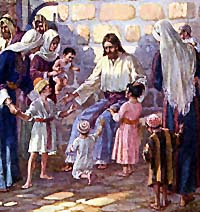
Conclusion: The Bible and the Children
Even if church history were unclear on the matter, the Bible is very clear. Every child in the womb has been created by God, and He has laid out a plan for that child's life. Furthermore, Christ loves that child and proved it by becoming like him - He spent nine months in His mother's womb. Finally, Christ died for that child, showing how precious He considers him to be.
Christ's disciples failed to understand how valuable children were to Him, and they rebuked those who tried to bring them near Him (Luke 18:15-17). But Jesus called the children to Him and said, “Let the little children come to me, and do not hinder them, for the kingdom of God belongs to such as these.” He did not consider attention to children a distraction from His kingdom business, but an integral part of it.
The biblical view of children is that they are a blessing and a gift from the Lord (Psalm 127:3-5). Society is treating children more and more as liabilities. We must learn to see them as God does - “He defends the cause of the fatherless and the widow, and loves the alien, giving him food and clothing” (Deuteronomy 10:18). Furthermore, we must act toward them as God commands us to act:
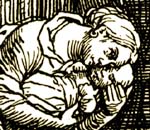
Defend the cause of the weak and the fatherless;
Maintain the rights of the poor and oppressed.
Rescue the weak and needy;
Deliver them from the hand of the wicked (Psalm 82:3-4).
As we intervene on behalf of His littlest children, let's realize it is Christ Himself from whom we intervene (Matthew 25:40).
 Recommended for further reading
Recommended for further reading
Randy Alcorn, Prolife Answers to Prochoice Arguments (Sisters, Oregon: Multnomah Press, 2000), 455 pp. (available online at Eternal Perspective Ministries or your local bookstore).
Also see: What does the Bible teach about abortion? Pro-life or pro-choice?
References
Virginia Ramey Mollenkott, “Reproductive Choice: Basic to Justice for Women,” Christian Scholar's Review (March 1988), p. 291. [up]
James Hoffmeier, Abortion: A Christian Understanding (Grand Rapids, Michigan: Baker Book House, 1987), pp. 46,50; Eugene Quay, "Abortion: Medical and Legal Foundations," Georgetown Law Review (1967), pp. 395,420; Meridith G. Kline, "Lex Talionis and the Human Fetus," Journal of the Evangelical Theological Society (September 1977), pp. 200-201. [up]
Lawrence O. Richards, Expository Dictionary of Bible Words (Grand Rapids, Michigan: Zondervan Publishing House, 1985), pp. 156-157. [up]
James Hoffmeier, editor, Abortion: A Christian Understanding and Response (Grand Rapids, Michigan: Baker Book House, 1987), p. 62. [up]
John Jefferson Davis, Abortion and the Christian (Phillipsburg, New Jersey: Presbyterian and Reformed, 1984), p. 52. [up]
Meridith G. Kline, “Lex Talionis and the Human Fetus,” Journal of the Evangelical Theological Society (September 1977), pp. 193. [up]
A Prochoice Bible Study (Seattle, Washington: Episcopalians for Religious Freedom, 1989). [up]
James Hoffmeier, Abortion: A Christian Understanding (Grand Rapids, Michigan: Baker Book House, 1987), pp. 53. [up]
See George Grant, Grand Illusions: The Legacy of Planned Parenthood (Brentwood, Tennessee: Wolgelmuth and Hyatt, 1988), pp. 190-191. [up]
Michael Gorman, Abortion and the Early Church (Downers Grove, Illinois: InterVarsity Press, 1982), p. 9. [up]
John Calvin, Commentary on Pentateuch, cited in Crisis Pregnancy Center Volunteer Training Manual (Washington, D.C., Christian Action Council, 1984), p. 7. [up]
Dietrich Bonhoeffer, Ethics (New York: Macmillan, 1955), p. 131. [up]
Karl Barth, Church Dogmatics, Vol. 3, editor, Geoffrey Bromiley (Edinburgh: T&T Clark, 1961), pp. 415, 418. [up]
An excellent refutation of the various “Christian” prochoice arguments is made by philosophy professor Francis Beckwith in “A Critical Appraisal of Theological Arguments for Abortion Rights,” Bibliotheca Sacra (July/September 1991), pp. 337-355; also see: Web site: Life Before Birth - ChristianAnswers.Net/life. [up]
Author: Randy Alcorn, Eternal Perspective Ministries. Used by permission of the author. Excerpted from Mr. Alcorn's excellent book: Prolife Answers to Prochoice Arguments.
Text copyright © 2000, 2002, Eternal Perspective Ministries. Illustrations property of Christian Answers. All Rights Reserved—except as noted on attached “Usage and Copyright” page that grants ChristianAnswers.Net users generous rights for putting this page to work in their homes, personal witnessing, churches and schools.
